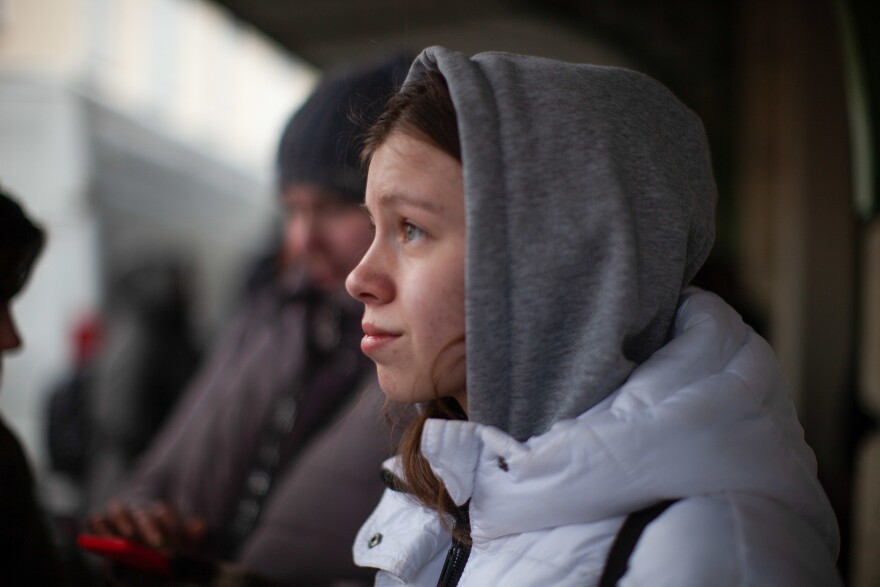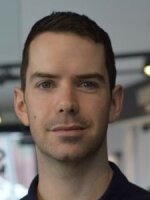PRZEMYSL, Poland — As the mayor of a small city hugging the border with Ukraine, Wojciech Bakun admits he was ill-prepared to become a front-line humanitarian worker dealing with the fastest exodus of refugees in Europe since World War II.
More than 2.5 million people have left Ukraine in the two weeks since Russia began its invasion of the country, and Poland has taken the majority of them.
And the place in Poland where most have crossed into is Bakun's city of Przemysl, in the country's southeast. Bakun estimates that about 350,000 people have arrived since Russian bombs started dropping in Ukraine, with those refugees fleeing into a city with a usual population of about 60,000.
"I was a member of the Polish parliament, so I have no experience with managing not only this situation, but managing a city," he says.
"Normally I work in a blue suit. Now I have a green one," he says, referring to his military-style uniform.
Refugees come off trains from Ukraine and into the Przemysl station having just endured a grueling journey marked by crowded carriages and high tension.
The ornate terminal building has been overtaken by a heaving sea of humanity; there is constant motion and a sense of contained mayhem. Hallways, chairs and sidewalks are full of people who look dazed, lost and desperate. They carry suitcases, children and dogs, while aid workers weave through the crowds handing out warm meals.
The mayor says it's crucial that the refugees keep moving west.
"We are not for collect-and-stay refugees here in this city," he says. "Transferring them very quickly to other cities in Poland is very important. You know, clean the border all the time."
"If you think about 1,200 to 1,500 refugees passing through the border every hour, we see that situation and we have to [keep] moving very quick."


Humanitarian aid groups and foreign government officials have had high praise for the way Poland has handled the influx of Ukrainian refugees. Bakun's social media pages are flooded with comments praising his work, and memes have been created lauding him for standing up for Ukraine and lashing Russian President Vladimir Putin.
Yet some people who follow Polish politics are surprised by Poland's response to the refugee crisis because its leaders had been openly opposed to migrants up until now. Bakun himself belongs to the Kukiz15 political movement, which specifically expressed anti-Ukrainian views.
"They actually advocated building a wall on the Polish-Ukrainian border that was obviously inspired by Trump's idea of a wall on the Mexican border," says Rafal Pankowski, a sociology professor who tracks far-right groups for the Never Again association in Warsaw, Poland.


He says the rhetoric that conservative Polish politicians have used to describe Ukrainians has sounded a lot like the way immigration opponents in the U.S. talk about people from Mexico and Central America: claiming that they steal jobs and change the fabric of society.
"They actually warned against what they called the 'Ukrainization' of the Polish labor market," Pankowski says.
Just this week, a member of Poland's parliament claimed that emergency legislation to support Ukrainian refugees would make Polish people second-class citizens in their own country.

Since the war began, there has also been racism against nonwhite refugees at the border. Last week in Przemysl, Polish extremists chanted nationalist slogans and attacked African and Asian refugees coming to the train station from Ukraine. And YouTube videos that warn that a flood of Ukrainians will drain Poland's resources have attracted thousands of views.
But Pankowski, the sociology professor, says that these views are in the minority and that he is surprised by how quickly the anti-refugee attitude has become unpopular in Poland.
"I think this is one of those examples showing that in dramatic times like the last two weeks, people change," he says. "And faced with a big challenge and faced with a big tragedy, a change of heart is possible, and I think that applies to many people in Poland."
"I just very much hope that this positive attitude and the sympathy and solidarity are going to stay with us."


He believes Przemysl's mayor is one of those people who has changed. But Bakun rejects this and insists that he is exactly the same politician he always was.
"A refugee is a person who is on the border with the country affected by war," he says. "So that is the situation. We have refugees in Ukraine."
He says two weeks ago, Ukrainians were not refugees because there wasn't a war. The war, he insists, is what has changed — not him.
This crisis has been going on for only two weeks, and Bakun insists the current system supporting refugees can't hold up forever.
"It's only volunteers. So, you know, they work if they have energy," he says. If the volunteers go home, he warns, his small city could collapse under the strain. "Now we start talking with professional humanitarian organizations to manage that situation with us."

The mayor is proud of the job that he and his city have done for the past two weeks, but they aren't the experts in this area. And as the war goes on, he says, others are going to have to step in to make this emergency operation sustainable for the long term.
The lives of millions of people who may cross this border in the future could depend on it.
Copyright 2023 NPR. To see more, visit https://www.npr.org.



![Refugees from Ukraine flood the main hall at the Przemysl train station in southern Poland. "If you think about 1,200 to 1,500 refugees passing through the border every hour, we see that situation and we have to [keep] moving very quick," said Przemysl Mayor Wojciech Bakun.](https://npr.brightspotcdn.com/dims4/default/d7a8198/2147483647/strip/true/crop/3500x2333+0+0/resize/880x587!/quality/90/?url=https%3A%2F%2Fmedia.npr.org%2Fassets%2Fimg%2F2022%2F03%2F10%2F_e8a2544-891_custom-823638730ee481025dfe0ef2ff41cf589827259b.jpg)



